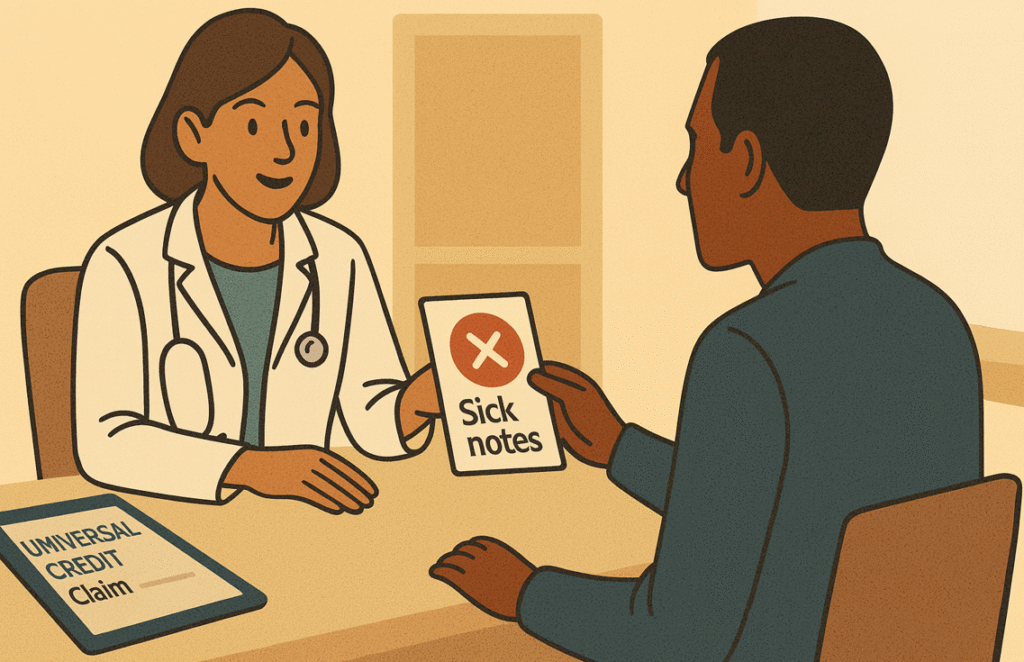Introduction
So, you’re wondering: “When do you stop sending sick notes Universal Credit?” It’s a common question—especially if you’ve been off work due to illness and are juggling your Universal Credit (UC) responsibilities. This guide breaks it down clearly. We’ll walk through when and why you need to send fit notes, what triggers a stop, and what happens if you’re told something different than what official guidance says.
What is a fit note and why does Universal Credit ask for it?
If you’re claiming Universal Credit and can’t work due to health issues, you’ll need to send in a medical document known as a fit note. It used to be called a sick note.
- Fit notes confirm your GP or health professional agrees you’re not fit for work.
- They kick off the Work Capability Assessment (WCA) process if you’re unwell for more than 28 days.
What does a fit note include?
It usually states how your illness affects your ability to work and may include any suggested workplace adjustments.
- The fit note might mention whether you are ‘not fit for work’ or ‘may be fit for work’ with certain changes.
- It can include details like avoiding lifting, needing flexible hours, or limiting screen time, depending on your condition.
- These notes can guide both your UC case manager and your employer in offering reasonable accommodations.
- Accurate and detailed fit notes strengthen your claim and reduce the risk of delays or misunderstandings.
How long must you send sick notes to Universal Credit?
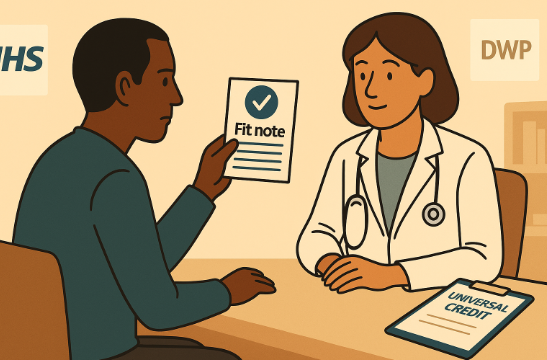
The guideline is straightforward: continue delivering fit notes until instructed to cease by the Department for Work and Pensions. That only happens when they make a decision about your work capability.
- Fit notes must be continuous. No gaps!
- If one ends and you’re still unwell, get a new one.
What happens during the Work Capability Assessment (WCA)?
This is the formal process to decide if you’re well enough to work or prepare for work. It determines if you fall into:
- LCW (Limited Capability for Work), or
- LCWRA (Limited Capability for Work-Related Activity).
These categories help determine the kind of support and obligations you have while claiming Universal Credit.
- LCW means you’re not expected to work right now, but you may need to prepare for work in the future.
- Who qualify for LCWRA? LCWRA means you’re not expected to work or undertake work preparation activities due to the severity of your condition.
- The assessment considers how your condition affects activities like standing, moving, interacting with others, and completing tasks.
- Medical assessors use a points-based system and descriptors to classify your functional limitations into one of these categories.
What evidence do I need for a Work Capability Assessment?
Collect GP notes, letters from specialists, hospital records, and a personal statement explaining how your illness limits your day-to-day life.
- Include prescription records or a medication list that shows the intensity or duration of your treatment.
- Supporting documents from a mental health practitioner can be particularly useful for hidden disabilities or fluctuating conditions.
Can you self-certify for the first week?
Yes, you can. For the first 7 days, you don’t need a fit note.
- This is known as self-certification, where you declare your illness without needing medical confirmation.
- You must still inform Universal Credit about your sickness by updating your online journal.
- After day 7, you’ll need to obtain a fit note from a qualified health professional to continue receiving support.
- Failure to transition from self-certification to a fit note can result in disruptions to your Universal Credit claim.
How do I report self-certification on Universal Credit?
Log into your UC journal and report the sickness under “Report a change” > “Health condition.” Then, submit the fit note once the self-certification period ends.
- Be sure to input the correct start and end dates of your illness to match your self-certification period.
- If you experience a relapse or new symptoms, you can report it as a new health condition within the journal for continued support.
When do you finally stop sending sick notes to Universal Credit?
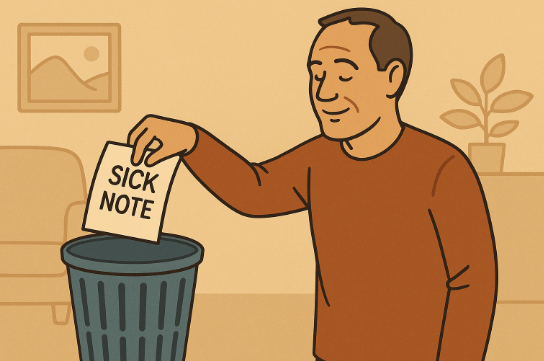
You stop only when you receive the official decision from DWP about your work capability.
- If awarded LCWRA, no more sick notes needed.
- If awarded LCW, also no longer required.
What happens after 28 days of illness on Universal Credit?
The DWP will start the Work Capability Assessment (WCA) procedure to determine your capacity to work once your sickness lasts more than 28 days. This stage is critical because it determines what kind of support you’ll receive and what responsibilities you’ll have.
- After 28 days, you’re expected to provide continuous fit notes unless told otherwise.
- The DWP may send you a UC50 form, which you must complete with details about how your condition affects you.
- You’re likely to be scheduled for a face-to-face, phone, or video assessment as part of the WCA.
- Based on this assessment, the DWP will determine if you’re eligible for LCW or LCWRA.
- During this period, continue updating your UC journal and submitting all medical documentation.
How to recognise when you’ve got an official UC decision
The decision will appear in your UC journal or as a letter titled something like “Work Capability Assessment Outcome.” You might also receive a notification through the UC app or by SMS/email prompting you to check your journal. The entry usually confirms your LCW or LCWRA status, effective from a specific date. Always read the full message to understand any ongoing requirements. If you’re unsure, contact your work coach or the UC helpline for confirmation.
How long does it take to get a decision after WCA?
It typically takes 4–12 weeks after your assessment. Sometimes longer, depending on DWP backlogs.
- Delays often occur if additional medical evidence is requested or if appointments are rescheduled.
- You can track the progress of your assessment through updates in your UC journal or by contacting your case manager.
Why fit notes may still be needed by your employer
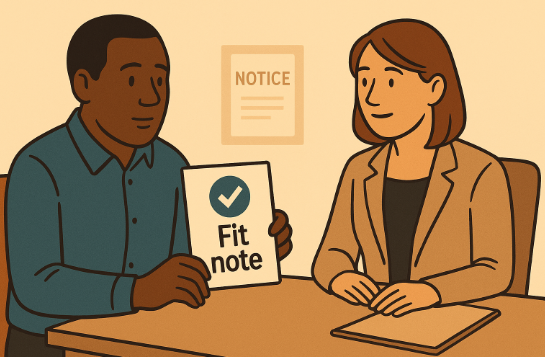
- Even if Universal Credit no longer needs them, your job might.
- Some companies have strict sick leave policies that require updated medical evidence regardless of UC decisions.
- Fit notes might also be necessary for insurance claims, occupational health reviews, or workplace adjustments.
Do I need to give my employer a fit note if I get LCWRA?
Yes. Employers can still ask for fit notes to process Statutory Sick Pay or manage workplace policies.
- Fit notes may also be used to support phased returns to work or request reasonable adjustments under the Equality Act.
- Some industries, like healthcare or construction, have stricter health reporting protocols, making fit notes essential even after UC requirements end.
How conditionality reforms affect fit note culture
The government is pushing for more work-focused support, even for those with health issues. This means you might still have to engage with work coaches.
- You may be asked to attend mandatory work preparation sessions or regular check-ins even while you’re providing fit notes.
- The goal is to encourage as many people as possible to consider future employment opportunities, with health support tailored to individual needs.
What happens if I refuse to engage with a work coach while sick?
Unless you’ve been declared LCWRA, skipping appointments or not providing evidence could lead to sanctions.
- Always inform your work coach in advance if you’re unable to attend an appointment due to health reasons, and provide supporting documentation if possible.
- Repeated missed appointments, even with a fit note, may trigger a review of your commitment to work-related activity, affecting your payments.
What if Universal Credit says you don’t need to send fit notes anymore?
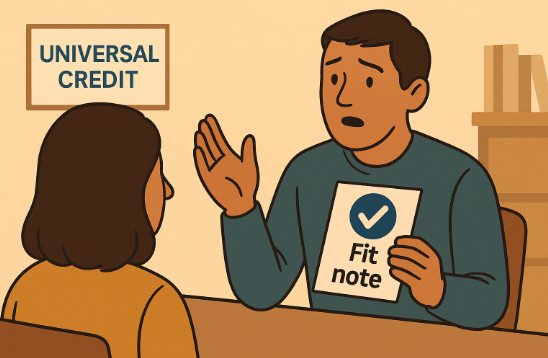
Sometimes claimants are told, “You don’t need to send more sick notes.” But unless that comes as a formal decision, don’t stop.
- Only stop if your journal shows a capability decision.
- Misinformation happens—double-check everything.
“Until you receive a letter, you need to continue providing fit notes.” — Scope Community Moderator
The risk of stopping too early
Your Universal Credit claim may be at risk if you stop taking fit notes before you have received an official decision.
- Without continuous fit notes, the DWP may assume you’re fit to work, which could reduce or stop your payments.
- If you’re told by a work coach or system message to stop but haven’t received a formal decision, always double-check.
- Gaps in fit notes can delay or cancel the Work Capability Assessment process.
- Some claimants report having to restart the entire WCA process after prematurely stopping fit notes.
Does being sanctioned affect fit note requirements?
Even with valid fit notes:
- You get a 14-day grace period where job search rules pause.
- After 14 days, you might be expected to attend work-focused interviews unless you’re in LCWRA.
Conclusion
So, when do you stop sending sick notes Universal Credit? When the DWP makes a decision after your Work Capability Assessment. Before that, keep submitting them. If you stop too early, it could hurt your claim.
Just remember:
- Self-certify for the first 7 days.
- Keep your fit notes continuous.
- Stop only after a formal decision.
FAQ’s about when do you stop sending sick notes universal credit?
1. Do I need to send fit notes while waiting for a WCA decision?
Yes, without gaps.
2. Can I stop if my UC journal says “don’t send more”?
Only if it’s a formal decision notice.
3. Will my employer still need fit notes?
Possibly, especially for SSP.
4. How long does a WCA decision take?
Usually 4–12 weeks.
5. Who can issue fit notes?
GP, nurse, pharmacist, or other certified professionals.
I’m Laura Wilson, a passionate blogger and content creator with a deep interest in business, finance, and entrepreneurship. I’ve had the opportunity to write for several premium blogs, sharing insights & practical advice for individuals & small businesses. I’m the founder and publisher of ukbusinessmag.co.uk, where I focus on creating valuable, easy-to-understand content to help UK startups & SMEs grow.

